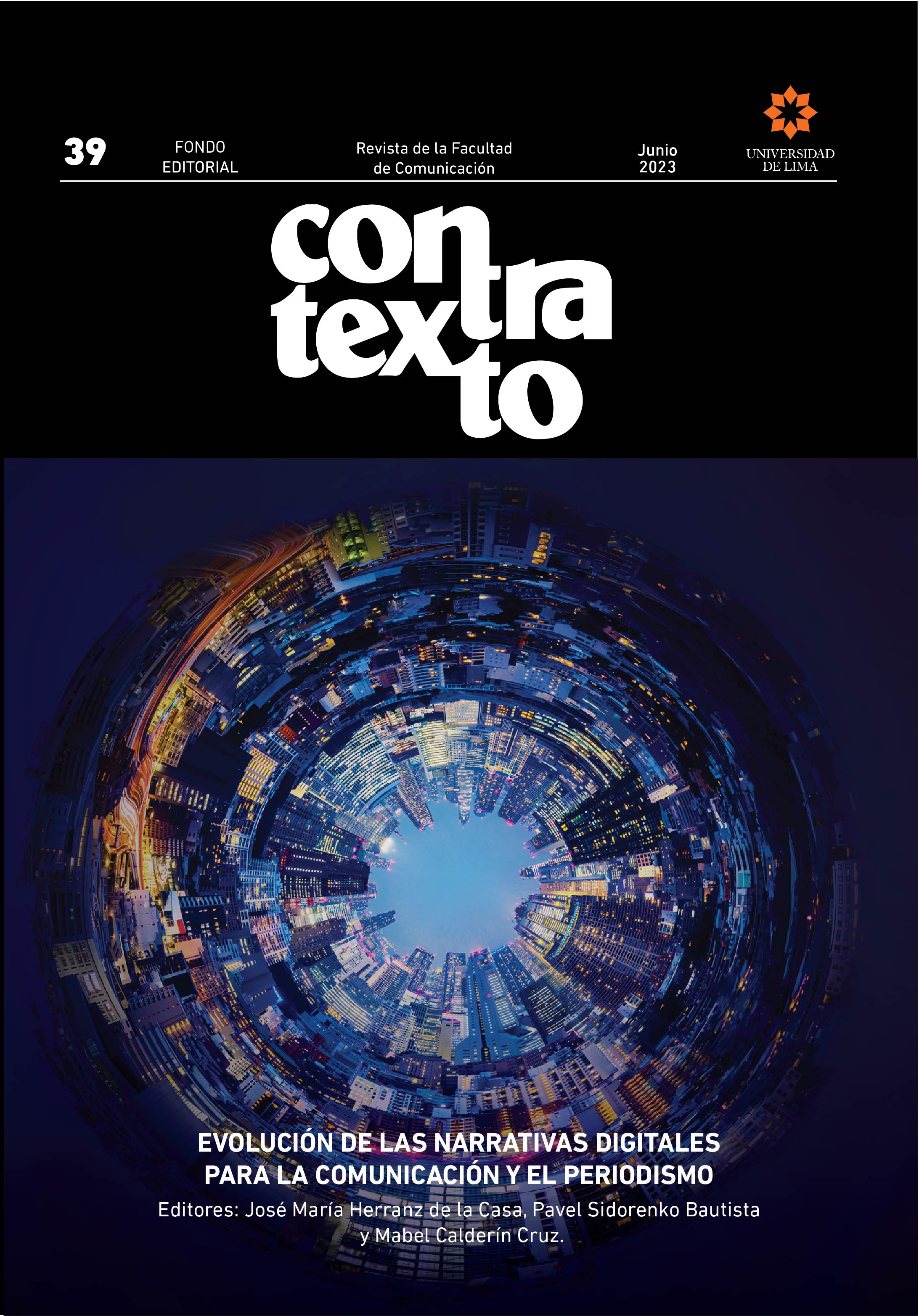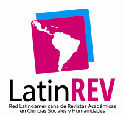Relationship between media and audiences in WhatsApp groups in Cuba: an approach from the agenda setting
DOI:
https://doi.org/10.26439/contratexto2023.n39.5827Keywords:
WhatsApp, agenda-setting, tools, communication, audiencesAbstract
The study aims to explain the relationship between the agenda of the Sierra Maestra newspaper in Santiago de Cuba and that of its readers through two WhatsApp groups created by the newspaper from June to October 2021. A quantitative research design was employed using techniques such as content analysis in the selected groups and applied survey in their members. The study determined that there is no thematic relationship between the newspaper’s agenda and that of its readers. This is influenced by the little involvement of journalists in solving the problems of the group members, the slight possibility of criticizing in that space, the insufficient feedback between the country’s social institutions and the readers, and the ineffective role of journalists as informers. This analysis is part of a series of studies on the agenda-setting in Cuban WhatsApp groups and delves into the need to efficiently use this platform according to the media.
Downloads
References
Andueza, M., & Pérez R. (2014). El móvil como herramienta para el perfil del nuevo periodista. Historia y Comunicación Social, 19, 591-602. https://doi.org/10.5209/rev_HICS.2014.v19.44987
Angeluci, A. C., Scolari, G., & Donato, R. (2017). O WhatsApp como actante: o impacto do aplicativo interativo em redações jornalísticas. Mediação, 19(24), 195–214. http://revista.fumec.br/index.php/mediacao/article/view/3778
Aruguete, N. (2013). La narración del espectáculo político: pensar la relación entre sistema de medios y poder político. Austral Comunicación, 2(2), 205-216. https://doi.org/10.26422/aucom.2013.0202.aru
Aruguete, N. (2017). The agenda setting hypothesis in the new media environment. Comunicación y sociedad, (28), 35-58. https://doi.org/10.32870/cys.v0i28.2929
Batra, B. (2016). News communication through WhatsApp. International Journal of Informative & Futuristic Research, 3(10), 3725-3733.
Bilton, R. (2014, 3 de mayo). WhatsApp emerges as big share driver for publishers. DigiDay. http://digiday.com/media/publishers-see-big-sharing-numbers-via-whatsapp/
Boczek, K., & Koppers, L. (2020). What’s new about WhatsApp for news? A mixed-method study on news outlets’ strategies for using WhatsApp. Digital Journalism, 8(1), 126-144. https://doi.org/10.1080/21670811.2019.1692685
Boczkowski, P. J., & Mitchelstein, E. (2013). The news gap. When the information preferences of the media and the public diverge. The MIT Press.
Bonete Vizcaíno, F. (2020). Luces y sombras en el uso de WhatsApp en los diarios digitales españoles. Hipertext.net, (20), 87-97. https://doi.org/10.31009/hipertext.net.2020.i20.07
Bradshaw P. (2015, 19 de mayo) Lessons on using WhatsApp for publishing - an election experience. Online Journalism Blog. https://onlinejournalismblog.com/2015/05/19/tips-on-using-whatsapp-for-publishing-an-election-experience/
Campbell, S. W., & Kwak, N. (2011). Political involvement in “mobilized” society: the interactive relationships among mobile communication, network characteristics, and political participation. Journal of Communication, 61(6), 1005-1024. https://doi.org/10.1111/j.1460-2466.2011.01601.x
Castillo, Y. (2020). Modelo sociológico de la comunicación para la interrelación de las agendas pública, política y mediática en función del desarrollo cultural comunitario [Tesis de doctorado no publicada]. Universidad de Oriente.
Church, K., & Oliveira, R. de. (2013). What’s up with WhatsApp?: comparing mobile instant messaging behaviors with traditional SMS. En MobileHCI'13. Proceedings of the 15th International Conference on Human-Computer Interaction with Mobile Devices and Services (pp. 352-361). ACM. https://dl.acm.org/citation.cfm?id=2493225
Dearing, J. W., & Rogers, E. (1996). Agenda-setting (vol. 6). Sage publications. Dodds, T. (2019). Reporting with WhatsApp: Mobile chat applications’ impact on journalistic practices. Digital Journalism, 7(6), 725-745. https://doi.org/10.1080/21670811.2019.1592693
Fares, F. (2018). WhatsApp y Periodismo. Análisis del uso de WhatsApp en los medios de información españoles. Hipertext.net, (16), 78-92. https://doi.org/10.31009/hipertext.net.2018.i16.12
Feezell, J. T. (2018). Agenda setting through social media: The importance of incidental news exposure and social filtering in the digital era. Political Research Quarterly, 71(2), 482-494. https://doi.org/10.1177/1065912917744895
Gallego, J. R., & Rosabal, A. (2013). Las cartas sobre la mesa. Un estudio sobre la relación entre agenda pública y mediática en Cuba: caso Granma. Signo y Pensamiento, 32(62), 98-113.
Gazit, T., & Aharony, N. (2018). Factors explaining participation in WhatsApp groups: an exploratory study. Aslib Journal of Information Management, 70(4), 390-413. https://doi.org/10.1108/AJIM-03-2018-0053
Gomes-Franco, F., Colussi, J., & Rocha, P. M. (2016). WhatsApp como herramienta de participación ciudadana en radio: el caso del programa Las mañanas de RNE. En A. Larrondo, K. Meso & S. Peña (Eds.), VIII Congreso Internacional de Ciberperiodismo (pp. 172-189). Universidad del País Vasco, Servicio Editorial.
Gómez del Castillo, M. T. (2017). Utilización de WhatsApp para la comunicación en titulados superiores. Revista Iberoamericana sobre Calidad, Eficacia y Cambio en Educación, 15(4), 51-65. https://doi.org/10.15366/reice2017.15.4.003
Jenkins, J., & Nielsen, R. K. (2018). The digital transition of local news. Reuters Institute. https://www.digitalnewsreport.org/publications/2018/digital-transition-local-news/
López-Cantos, F. (2017). WhatsApp. Hábitos de uso y construcción de identidad visual con mensajería móvil. ICONO 14, 15(2), 70-91. https://doi.org/10.7195/ri14.v15i2.996
McCombs, M., & Evatt, D. (1995). Los temas y los aspectos: explorando una nueva dimensión de la agenda setting. Communication & Society, 8(1), 7-32. https://doi.org/10.15581/003.8.35616
McCombs, M. E., & Valenzuela, S. (2014). Agenda-setting theory: The frontier research questions. Oxford Handbooks Online.
McCombs, M. E., & Shaw, D. L. (1972). The agenda-setting function of mass media. Public Opinion Quarterly, 36(2), 176-187. http://www.jstor.org/stable/2747787
Montenegro, D. (2020). Comunicación grupal en WhatsApp para el aprendizaje colaborativo en la coyuntura COVID-19. Hamut'ay, 7(2), 34-45. http://dx.doi.org/10.21503/hamu.v7i2.2131
Muñiz, V. (2017). Fuentes, medios y públicos en Cuba: hacia una articulación posible. Modelo de análisis de la relación inter-agendas sobre temas experienciales en medios provinciales cubanos [Tesis de doctorado, Universidad de La Habana]. Scriptorium.
Muñiz, V., & Castillo, Y. (2017). La brecha entre medios y públicos en Cuba. Pautas para un diálogo necesario desde la agenda setting. Alcance, 6(13), 89-113.
Muñiz, V., & Fonseca, R. Á. (2015). Caracterización de las agendas mediática y pública en las provincias cubanas entre 2011 y 2014: el caso de Santiago de Cuba. Signo y Pensamiento, 34(67), 76-92. http://dx.doi.org/10.11144/Javeriana.syp34-67.camp
Negreira Rey, M. C., López García, X. & Lozano Aguiar, L. (2017). Instant messaging networks as a new channel to spread the news: Use of WhatsApp and Telegram in the spanish online media of proximity. En. Á. Rocha, A. M. Correia, H. Adeli, L. P. Reis & S. Constanzo (Eds.). Recent advances in information systems and technologies (vol. 3, pp. 64-72). Springer International Publishing AG.
Pont-Sorribes, C., Besalú, R., & Codina, L. (2020). WhatsApp como canal de información política en España: credibilidad, perfil de usuarios y compartición de contenidos. Profesional de la información, 29(6). https://doi.org/10.3145/epi.2020.nov.19
Quan-Haase, A., & Young, A. L. (2010). Uses and gratifications of social media: a comparison of Facebook and instant messaging. Bulletin of Science, Technology & Society, 30(5), 350-361. https://doi.org/10.1177/0270467610380009
Ramalho, G. (2014, 27 de junio). Brazilian newspaper extra celebrates one year
using WhatsApp to connect reporters and readers. Knight Center for
Journalism in the Americas. https://latamjournalismreview.org/articles/brazilian-newspaper-extra-celebrates-one-year-using-whatsapp-to-connectreporters-and-readers/
Renner, N. (2016, 4 de noviembre). A new role in journalism: the digital fixer. Columbia Journalism Review. https://www.cjr.org/tow_center/new_role_journalism_digital_fixer.php
Rubio-Romero, J., & Perlado, M. (2015). El fenómeno WhatsApp en el contexto de la comunicación personal: una aproximación a través de los jóvenes universitarios. ICONO14, 13(2), 73-94. https://doi.org/10.7195/ri14.v13i2.818
Scribano, A. (2017). Miradas cotidianas. El uso de WhatsApp como experiencia de investigación social. Revista Latinoamericana de Metodología de la Investigación Social, 13(7), 8-22. http://www.relmis.com.ar/ojs/index.php/relmis/article/view/207
Sedano, J., & Palomo, M. B. (2018). Aproximación metodológica al impacto de WhatsApp y Telegram en las redacciones. Hipertext.net, (16), 61-67. https://doi.org/10.31009/hipertext.net.2018.i16.10
Starri, M. (2020, 24 de abril). Digital 2020. We Are Social. https://wearesocial.com/digital-2020
Thorndyke, J. (2012). The role of agenda setting in social media. A look at the relationship between Twitter and the mass media’s agenda. Vasa.
Valeriani, A., & Vaccari, C. (2018). Political talk on mobile instant messaging services: a comparative analysis of Germany, Italy, and the UK. Information, Communication & Society, 21(11), 1715-1731. https://doi.org/10.1080/1369118X.2017.1350730
Vargo, C. (2018). Fifty years of agenda-setting research. New directions and challenges for the theory. Agenda Setting Journal, 2(2), 105–123. https://doi.org/10.1075/asj.18023.var
WhatsApp. (s.f.). Funciones. https://www.whatsapp.com/features/
Zumárraga-Espinosa, M. (2021). WhatsApp, comunicación móvil y participación política: un estudio cuantitativo en Ecuador. Contratexto, (35), 17-42. https://doi.org/10.26439/contratexto2021.n035.4839
Downloads
Published
Issue
Section
License
All of the works published are licensed under a CC BY 4.0 Creative Commons Attribution license. (updated on March 1st 2021)
The content of the journal may be shared in any material or format. The content may be adapted, contributed upon and transformed. Both possibilities are only permitted in so far as they complete the following conditions:
- Attribution: Credit must be given where it is due, a link to the license must be provided and changes, if made, must be indicated. This should be done in the manner deemed appropriate, without suggesting that the licensor promotes you or your use of the material.
Ownership rights
The patrimonial rights for Contratexto are published under a Creative Commons BY 4.0 license, allowing authors to keep the patrimonial rights to their work without restrictions.
If a work published in Contratexto were to be copied, distributed, spread, or any other activities contemplated in the aforementioned license, the author(s) and the journal must be mentioned visibly and expressly.
Self-archive
This journal allows and encourages authors to post items submitted to the journal on personal websites or institutional repositories both prior to and after publication, while providing bibliographic details that credit, if applicable, its publication in this journal.





















